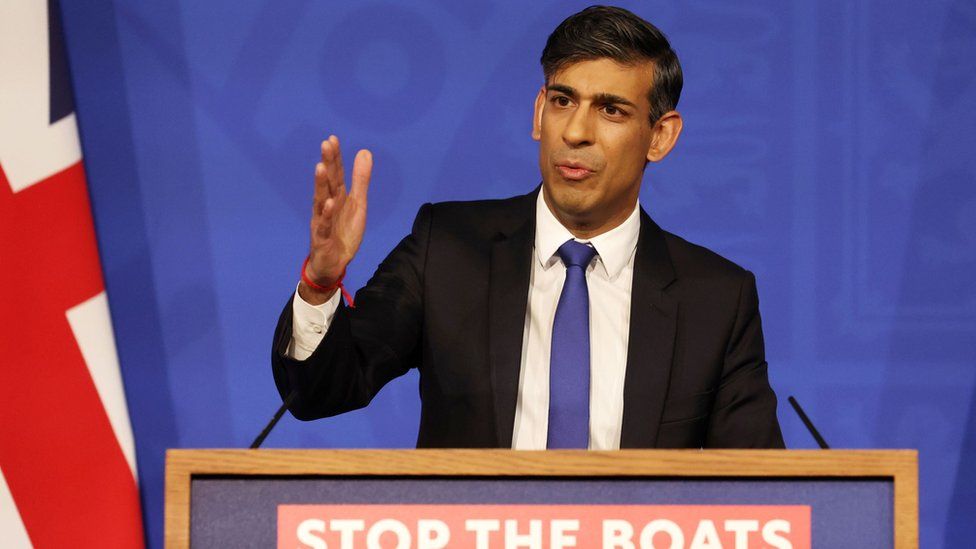12 minutes ago
About sharing
In the blizzard of guesswork about politics in the coming year, there’s a fact as solid as a lump of coal at the bottom of your Christmas stocking.
The election campaign has to begin in 2024, and it looks likely it will end, with the election itself, in 2024 too.
Indeed, the prime minister told reporters just before Christmas: “2024 will be an election year.”
First, let’s examine the facts about why the campaign legally has to begin in 2024.
Tuesday 17 December 2024 marks five years since Parliament met after the last general election, and so if Rishi Sunak hasn’t trundled to the palace to see the King to request a dissolution of Parliament before then, Parliament will dissolve automatically and a general election campaign would formally begin just before Christmas.
Tuesday 28 January 2025 is the latest the next election can legally be. (You can read more on all this here, courtesy of the Institute for Government).
So there was a snippet of hard facts.
Now comes the analysis.
Once we are into the new year, the sprocket wheel of general election fever will crank around a few notches. For some at least.
Most people miss most of what’s going on at Westminster most of the time, but there’s a mild risk nonetheless of getting a little tired of the E word.
Election.
I have been trying to ration how many times I used the E word in 2023, conscious that folk might say: “Oh shut up about it until you can tell us when it’s actually happening.”
The thing is, once we are into January all the parties will think, behave and prepare as though the election will be in the spring, until it legally can’t be.
Ditto the summer, ditto the autumn, and yes, ditto the winter.
As I’ve written before, there is an excitable industry of guesswork about the timing of the election at Westminster.
The timing will obsess Westminster to the point of tedium, with just a handful of folk around the prime minister in the know and/or influential in arriving at an answer.
It means the opposition parties, not least Labour, will have to work towards potential election dates that may turn out to be phantom – and do so several times until polling day is actually announced.
That has practical campaigning consequences: if you are Keir Starmer – or any of the other opposition leaders – what do you announce in, say, March, when the election might be two months away, or seven months away? Or more, or less?
For Labour, in particular, we are still in the foothills of scrutiny; this will notch up and up and up with every passing week next year.
For the Conservatives, the scrutiny has been incessant and Rishi Sunak has attempted multiple reboots to try to improve his political fortunes.
So far at least, they haven’t seemed to work.
Fifth term bid
Let’s put the coming general election into a bit of historical context.
In the past century, no party has won five general elections in a row.
Granted David Cameron needed a little help from the Liberal Democrats to get over the line in 2010, but the last four general elections have led to a Conservative prime minister.
Rishi Sunak is attempting to win a fifth on the spin.
Perhaps little wonder diminishing returns might be kicking in with those reboots.
The electorate tends to tire of parties that have been in government for a fair chunk of time.
History suggests it will be mighty difficult for the Conservatives to win again.
But then again, the Conservatives are incredibly good at winning general elections, including ones many suspect they will lose.
And Labour are very good at losing general elections, including ones many suspect they will win.
In 18 out of the 28 general elections since 1918 the Conservative Party have won the most seats.
Labour have won the most seats on the other 10 occasions.
And Labour approach the next election from a starting point that is the worst for them in nearly a century.
In 2019 they won 202 seats, their lowest number since 1935.
With Jeremy Corbyn as leader they secured 10.3 million votes, 32.1% of the total – a share lower than in 2017, but higher than in 2015 and 2010.
But it is seats that count and they need to count one heck of a lot more.
So, when it comes to the history books, something will have to give.
The Conservatives are seeking to make history.
Labour is seeking to win from a generationally bad starting point, from their perspective.
Lib Dem hopes
Next into the mix, the Scottish National Party, which was the colossus of Scottish politics at the last three general elections in a row.
And in government at Holyrood since 2007.
But the evidence – such as Labour’s victory in the Rutherglen and Hamilton West by-election – suggests they’re on the slide and Keir Starmer is super keen to capitalise.
The Liberal Democrats are chipper and are hopeful they can chip away at Conservative support, and seats, primarily in the south of England.
Reform UK, honorary president one Nigel Farage, continue to spook the Tories too with their polling numbers.
The Green Party lose their only MP Caroline Lucas, who is standing down – but hope to be competitive in a handful of places.
Then there is Plaid Cymru in Wales, and the platter of parties that contest Northern Ireland’s seats.
And talking of Northern Ireland, could devolved government return to Stormont early in the new year, with – for the first time – a Sinn Féin first minister? Let’s see.
So here goes with politics in 2024.
I reckon it’ll be a noisy one.
I’ll try to guide you through it.
And sorry in advance for the E word. It’ll feature quite a bit.
Related Topics
12 December
20 October
26 September
18 October
